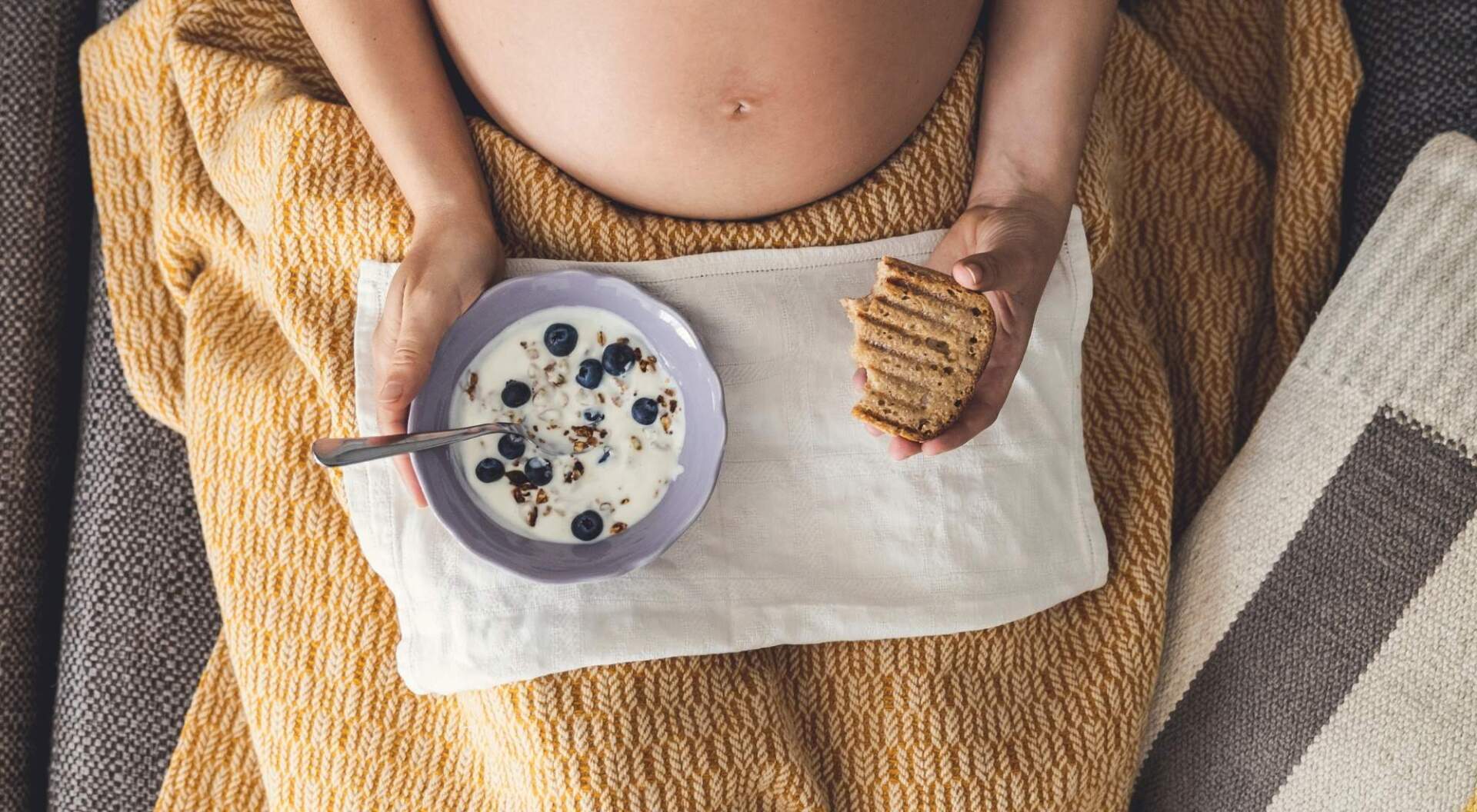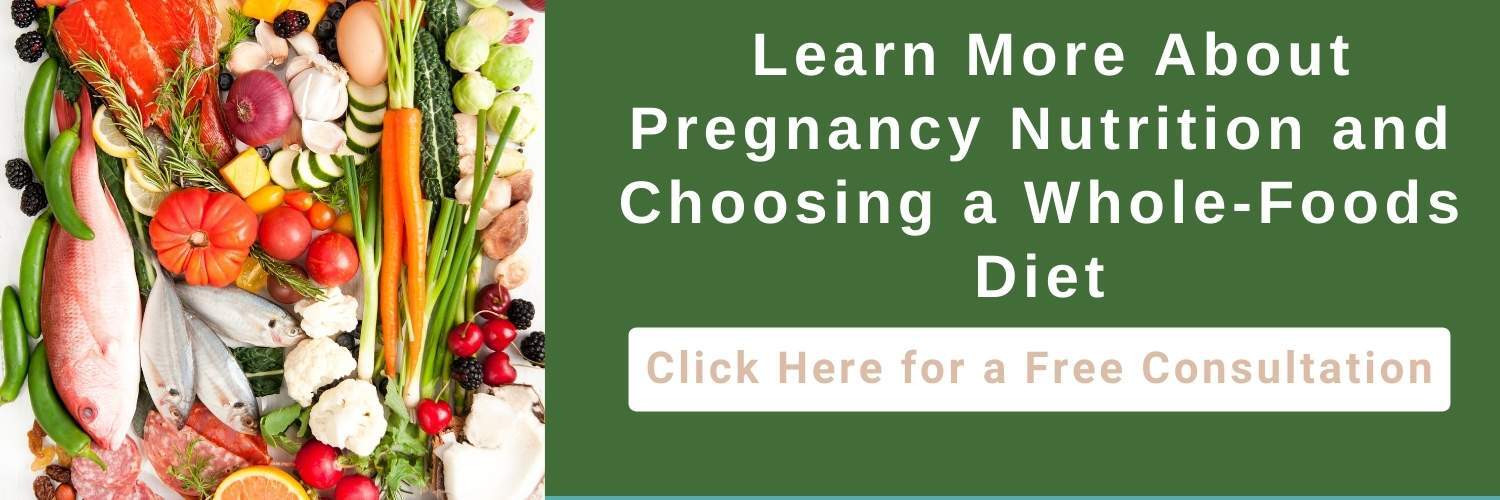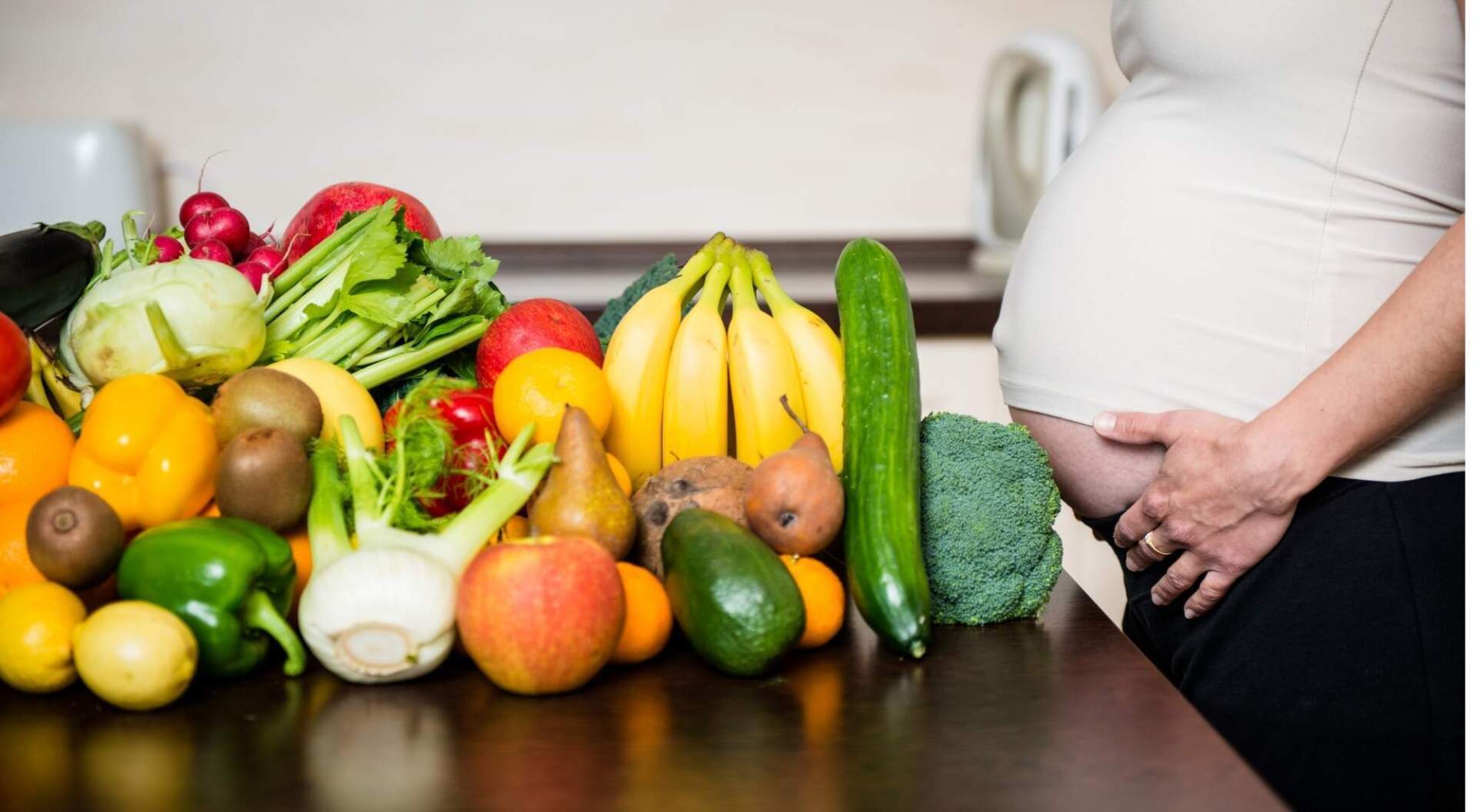Pregnancy, Your Nutritional Needs, and the Myth of “Eating for Two”
"The content below is not intended to be a substitute for professional medical advice, diagnosis, or treatment. Always seek the advice of your physician or other qualified health provider with any questions you may have regarding a medical condition."
Are you or someone you love currently expecting? This is such an exciting time!
Did you know eating well is one of the best things you can do during pregnancy? One of the greatest gifts you can give your developing baby is a nutritious, well-balanced diet. Healthy prenatal nutrition is crucial for a healthy baby.
When you are pregnant, your body will have more demands on it than it is used to. As a result, a healthy weight must be maintained while getting enough nutrients to support the growth of your baby.
This article will show you how to provide the best nutrition for you and your growing baby.
Table of Contents
Why Is Nutrition Important for Pregnant Women?
It cannot be overstated how important nutrition is during pregnancy. Pregnant women require more of many vitamins and minerals than prior to becoming pregnant.
You can give your baby what they need to grow by choosing healthy food every day. In addition, it will help you gain the appropriate amount of weight for you and your baby.
Let’s look at how nutrition plays a vital role in pregnancy.
Healthy Development of Your Baby
When you're pregnant, what you eat and drink is the main source of nourishment for your baby.
In addition to getting appropriate medical care, you can do other things to keep your baby healthy — diet and nutrition being one of the most important things in aiding your baby’s growth and development.
Make sure you follow a healthy diet and address any health problems you may have during pregnancy.
Managing the Additional Demands on Your Body
The body undergoes many changes during pregnancy. The changes can range from the familiar and expected, such as swelling and fluid retention, to the less typical, such as changes in vision.
Following are some of the bodily systems impacted by the demands placed on your body during pregnancy:
- Hormonal
- Sensory
- Breast
- Cervical
- Changes in the skin, hair, and nail
All of these bodily systems can be impacted by nutrition.
Maintaining a Healthy Weight
Weight gain during pregnancy is necessary for the health of your pregnancy and the long-term health of you and your child.
You can reduce the risk of health complications associated with a baby that is too big or too small by maintaining a healthy weight throughout pregnancy.
If you gain too much weight, you may face the following health risks:
- Symptoms of preeclampsia
- Gestational diabetes
- During delivery, the shoulder of the baby gets stuck (shoulder dystocia)
- Unplanned C-section
- Hard-to-shed postpartum pounds
It is also dangerous to gain less weight than recommended. When a baby is born with a low birth weight (less than five pounds and eight ounces), it may be difficult for them to:
- Breastfeed
- Fight infection; and
- Reach developmental milestones
Do Pregnant Women Have Special Nutrition Needs?
There are indeed specific requirements for pregnant women to ensure the proper development of their babies.
Considering that every pregnancy is different, why should every pregnant woman's diet be the same? It's simple, it shouldn’t.
Depending on your body's needs and the specific nutritional needs of your baby, Dr. Sergi at HealthierU can create a natural pregnancy diet for you.
Call us for your free consultation to find out how we can help you during this critical time.
8 Pregnancy Dietary and Supplemental Needs
The following are essential dietary and supplemental needs for all pregnant women.
#1: Folic Acid
Women of childbearing age are advised to consume 400 micrograms of folic acid (0.4 mg) each day by the U.S. Public Health Service.
Folic acid helps to reduce the risk of neural tube defects, which are congenital disabilities of the brain and spinal cord. Neural tube defects can cause paralysis, incontinence, and intellectual disability.
Folic acid is most beneficial when most neural tube defects are most likely occur, during the first 28 days after conception.
However, many women do not realize they are pregnant until 28 days after conception. As a result, folic acid should be consumed before conception and pregnancy.
The amount of folic acid your health care provider or midwife recommends will be based on your individual needs.
Among the foods that contain folic acid are:
- Legumes
- Asparagus
- Eggs
- Leafy greens
- Beets
- Citrus fruits
- Brussel sprouts
- Broccoli
- Nuts and seeds
- Beef liver
- Wheat germ
- Papaya
#2: Iron
Pregnant women need iron to support their baby's developing blood supply as well as their own. The recommended daily intake almost doubles during pregnancy because iron is essential for your baby's growth.
If your iron stores are too low during pregnancy, you run the risk of developing anemia. Anemia increases the risk of premature birth and low birth weights.
Pregnant women require 27 milligrams of iron per day (compared to adults 19 to 50 who are not pregnant and need 18 milligrams). Most prenatal vitamins include enough iron to cover this increase, but iron-deficiency anemia is common in pregnancy due to the increased need for blood.
For many, it's easy to prevent by filling your plate with plenty of iron-rich foods such as:
- Red meat
- Dark chocolate
- Pumpkin seeds
- Spinach
- Chicken liver
- Lentils
If needed, your doctor or midwife will prescribe an iron supplement.
#3: Calcium
Adequate calcium consumption is crucial whether or not you are pregnant, but it is essential for moms-to-be.
Aside from building your baby's bones, this all-star mineral also helps your skeletal system stay healthy.
Your body will deplete its calcium stores if you do not consume enough calcium during pregnancy, which puts you at risk for bone loss and increases your risk of osteoporosis later in life.
It is recommended that pregnant women consume 1,000 milligrams of calcium per day. You should aim for four servings of calcium-rich foods each day as a general rule.
Although prenatal vitamins rarely contain enough calcium to meet the recommended daily intake of 1,000 milligrams, dietary calcium sources quickly add up.
Some calcium-rich foods include:
- Milk
- Oranges
- Dates
- Dried figs
- Kale
- Yogurt
- Almonds
- Tofu
- Yogurt
- Kale
- Broccoli
#4: Vitamin D
Vitamin D helps build your baby's bones and teeth by maintaining calcium and phosphorus levels during pregnancy. This vitamin is also necessary for healthy eyesight and skin.
Consuming enough vitamin D while pregnant is vital in preventing abnormal bone development, fractures, or rickets in newborn babies.
It is recommended that pregnant women take between 600 and 2000 international units (IU) per day.
Consider consuming the following foods containing vitamin D:
- Rainbow trout
- Salmon
- Milk, fortified with vitamin D
- Cereal fortified with vitamin D
- Eggs
#5: Fruits and Vegetables
Aside from adding variety and color to your diet, fruit and vegetables are packed with nutrients that can support you and your baby during pregnancy.
Fruit and vegetables provide a comparatively high level of nutrients per calorie of all the food groups.
When your recommended intakes of many nutrients are higher than usual, yet your recommended calorie intake hardly changes, it is wise to eat nutrient-dense foods to get the most from each mouthful. Fruits and vegetables are excellent choices.
#6: Protein
The amino acids that make up protein are the building blocks of your body and your baby's body.
You need protein to help your baby develop skin, hair, fingernails, and muscles. Additionally, it maintains the balance of fluids in your body, helping you maintain normal blood pressure and preventing swelling during pregnancy.
Protein is vital throughout pregnancy, but it is particularly crucial in the second and third trimesters — when your baby grows the fastest.
Protein requirements for pregnant women can vary from
60 grams to 100 grams per day, depending on your weight, physical activity level, and trimester.
Meat is an excellent source of protein, but if you don't eat meat, you can get your protein needs from:
- Dairy products
- Beans
- Eggs; or
- Soy products
#7: Dairy
Dairy products are a great source of:
- Calcium
- Protein
- Vitamin D
- Phosphorus; and
- Other vitamins and minerals
These foods also contribute to your baby's heart, teeth, and nervous system development.
A few dairy sources include:
- Cheeses
- Yogurt
- Milk
- Ice cream
#8: Whole Grains
Mineral-rich whole grains are good sources of the B vitamins your growing baby needs for almost every part of their body while you're pregnant.
Choose whole grains over refined or enriched grains if you want to get the most vitamins, minerals, and fiber.
During pregnancy, whole grains are essential since, unlike refined grains which have had their bran and germ removed through milling,
they are unrefined and therefore contain more fiber and other nutrients, such as:
- Selenium
- Potassium; and
- Magnesium
Are You Really “Eating for Two?”
No. During pregnancy, “eating for two” isn’t actually necessary.
Even though your baby's nutrition is dependent on your diet during pregnancy, this does not mean you need to eat twice as much.
During the first trimester, you don't need any extra calories. However, about 340 extra calories are necessary for the second trimester and 450 extra calories in the third trimester.
You may need to eat more or less depending on your weight goal if you are overweight or underweight.
How Much Weight Should You Gain During Pregnancy?
The amount of weight you gain depends on your health and body mass index (BMI) before becoming pregnant.
Pregnant women who are underweight before pregnancy should gain more weight than those who were average weight before pregnancy. Conversely, overweight or obese women should gain less weight during pregnancy.
Weight gain varies by trimester.
For example, within the first 12 weeks of pregnancy, the first trimester, you might only gain one to five pounds. Some women do not gain any weight until the second trimester.
However, it is recommended that during the second and third trimesters, women gain one-half to one pound per week if you were a healthy weight before pregnancy.
If you are concerned about how much weight you should be gaining during your pregnancy, always consult your physician or obstetrician.
Foods You Should Avoid While Pregnant
Your growing baby is the most precious part of your life and you know the importance of putting healthy, nutritious foods into your body — but do you know what foods to avoid?
The following foods should be avoided while pregnant:
- Seafood high in mercury — Mercury can damage your baby’s nervous system.
- Raw, undercooked, or contaminated seafood — May contain bacteria and viruses.
- Undercooked meat, poultry, or eggs — Prevents foodborne illnesses.
- Unpasteurized foods — They can also have foodborne diseases.
- Unwashed fruits and vegetables — Wash fruits and vegetables to get rid of bacteria.
- Caffeine — The effects on your unborn baby are unclear. Pregnant women should avoid or limit caffeine to less than 200 mg per day.
- Herbal tea — Few data exist on the effects of specific herbs on developing babies. Therefore, avoid drinking herbal tea unless your health care provider approves.
- Alcohol —
There is no safe level of alcohol during pregnancy.
For a Healthy and Holistic Pregnancy, Contact HealthierU in Brooklyn, NY
Many health myths often misguide our minds against the true meaning of a healthy lifestyle, and this is especially true in pregnancy.
At HealthierU, we aim to help patients understand just how important proper nutrition is and how a healthy lifestyle can greatly impact your body, pregnancy, and baby.
Are you ready to learn more about how nutrition affects your body and your unborn baby’s body?
Contact
HealthierU to book your free consultation and learn about the care and diet plan options available to you.






